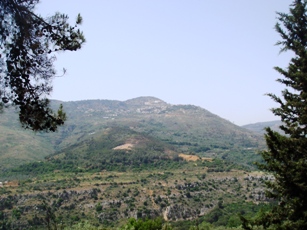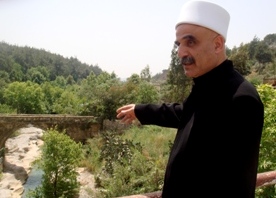Druze dedicate Lebanon's fragile Jisr el Qadi region as a Sacred Gift
June 8, 2009:
 |
 |
 |
"Life is this green tree that we have to plant, and without it there can be no life. We call upon religious authorities to take part in these activities, and we ask Lebanese people whatever their jobs, to contribute to the process of ecological protection." Lebanese PM Fuad Sinoura. PHOTO OF JISR EL QADI by ARC/Victoria Finlay |
The Druze in Lebanon last month pledged to dedicate the ecologically fragile Jisr-El-Qadi region in their ancient Chouf valley as a Sacred Gift to the Earth.
“I would like to announce here that the Druze Board has decided to consider the Jisr El Qadi forest as a natural resource” said Sheikh Sami Abilmona of the IRFAN Foundation, before an assembly of key religious leaders, government officers, politicians, diplomats and environmental NGOs – and in the presence of the Lebanese Prime Minister, HE Mr Fuad Sinoura. The occasion was the 2nd conference for religions and environment in Lebanon, hosted by environmental NGO AFDC, and it took place at the Prime Minister’s Palace in Beirut on May 13.
The journey to create the most recent Sacred Gift started in 2003 when ARC was introduced to some of the key decision-makers within the Shouf Valley. Sheikh Sami was later invited to meetings in Turkey and in Gotland, Sweden to discuss investments and forestry, “and when I returned from Sweden I was convinced that it was time for the Druze to create a sacred gift.”
 |
 |
 |
Sheikh Sami shows the Jisr-el-Qadi bridge that marks the centre of the Druze Sacred Gift to the Earth |
“ARC had a pioneering role in launching this interest [by the Druze]” said Sheikh Sami . “And we have followed on the path...After the ARC conference on faith and forestry in Sweden, 2007, we raised the idea of giving a Druze Sacred Gift to the land, and this was welcomed positively by the Druze community. The dedication of Jisr El Qadi is aimed at honouring what God has given us. We hope that this site, which our ancestors have preserved, will be preserved by us also. We will match this through prayer, spiritual exercises, physical and mental outreach.”
Jisr-el-QadiJisr el Qadi means the Bridge of the Judge, and it has an important cultural heritage as a link between the Chouf region and the Aley region of Mount Lebanon. It is 32 km from Beirut, and there are both Druze and Christians living near it.
According to General Director of the Druze Religious Council, Marzen Fayad, It is a place of medicinal plants, of wild thyme for mouthwash, of wild roses for drinks, of rarer flora, and of migrant and local birds. “We are hoping too for a decree on hunting: people often just shoot these birds, whether or not they are rare. This is a place that we want to conserve – and it is important for everyone to collaborate in order to achieve this…. We need tools and training, we need to guard against forest fires and we need guidance and infrastructure for eco-tourism, or perhaps eco-religious tourism,” he said.
As a sign of hope for these steep hillsides, 5000 trees were planted recently by AFDC in a place that was destroyed by forest fire last year.
“This is the new sacred gift,” said Marzen Fayad, “and we will make an action plan to stop the degradation: and to tell people, in Lebanon and beyond, about what we are doing.”
The Next StepsAfter the commitment, comes the hard work. The dedication of the Sacred Gift will involve attention-raising, fund-raising and collaboration between government, NGOs and with other faiths in Lebanon. Particularly important, Sheikh Sami acknowledged, was the collaboration with the Maronites, who pioneered this movement with the dedication of the Harissa Forest in 2000. “We will fund principles for education, unify our religious coventant, and we will encourage others to give more green spaces belonging to religious committees, and encourage students and tourists,” he said.
“We are honoured now to be one of the pioneers ourselves, and we are very confident that this will gain in momentum. This will be a place that Druze people will visit for many years – for pleasure and for contemplation.”
Maronite – seven points for protecting the environmentMeanwhile the Maronites are continuing by adding a third area - close to the northern city of Jbeil-Byblos - to their existing two sacred areas of Harissa and Qadisha. “The Catholic and Orthodox churches have expressed their concern about the negative impact on creation and people, and believers must sign these covenants with a daily commitment,” said Monsignor Camille Zaidan, who represents Patriarch Sfeir on matters of the environment. “This is our responsibility to ourselves, to creation and to God.”
He underlined a seven point plan for protecting the environment through what he called “a radical change from the heart”.
1. Going back to humility and accepting the limitations of our power over creation
2. Acknowledging our lack of knowledge
3. Adopting new approaches and generating a new culture founded on an ethical ecological attitude.
4. Recognising that humanity has the right to benefit from a better environment than this one: an environment that is free from humiliation, scarcity and bloodshed.
5. Correcting the discoveries in the light of the next generation
6. Acknowledging the diversity of responses and that each has a role to play, whether governments, individuals or civil society
7. Recognising that God and humanity have exceptional powers of healing and we CAN change the environment for a better future.
The Prime Minister’s Response“I would like to salute the organizations, municipalities and all our friends for giving such importance to such a vital element of religious leadership,” said the prime minister, Fuad Sinoura. “Lebanon has witnessed a huge deterioration of natural ecosystems, and a reluctance to allocate resources to make up for what we are misusing and to meet the growing consumption of Lebanese citizens. It is important for someone to ring the alarm for us.
We have tackled some issues and tried to solve them – we have commissioned studies about the coastline, we are undertaking trials in dealing with solid waste – but our efforts are not enough to solve these various issues. We need serious and unprecented efforts: this is an issue in which each citizen is concerned.
Life is this green tree that we have to plant, and without it there can be no life. We call upon religious authorities to take part in these activities, and we ask Lebanese people whatever their jobs, to contribute to the process of ecological protection.
Historians trace Druze origins to the 11th century in Cairo where they began as an Islamic reform movement. Although the Druze are not necessarily regarded as Muslims by other Muslims, here they are placed under the Islamic faith, following the teachings of the Druze themselves.
Link here for the full Druze theological statement about forests.
Link here for more details about the Visby Faiths and Forests meeting.
Link here for more details about ARC’s Lebanese sister organisation AFDC.
Link here for a series of prayers about forests, from different faiths.
Link here for more details about ARC’s forest projects in general.
More about Seven Year Plans.
Latest Guidelines for the Seven Year Planx
A leaflet on the Seven Year Plan.
Launch of the Seven Year Plan.
Link to the Frequently Asked Questions.
Eco-Audits.
|

